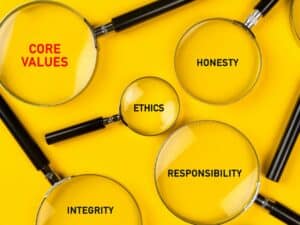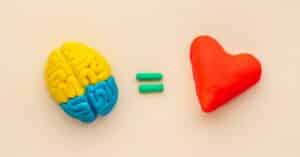Getting to grips with your core personal values (aka moral values) is a pretty critical step in your personal development journey, whether you are building a business, forging a successful career, or building a family.
By determining your most important personal values you will have a prism through which you can make informed decisions and measure how you behave.
Think of your values as the moral code by which you live your own life.
Who are you and what is your WHY?

It seems like a pretty straightforward question, doesn’t it!?
But, when asked, few of us can answer meaningfully. Unfortunately, the majority of answers are superficial and use labels such as:
- Names – “My name is Matthew”
- Job titles – “I’m a Director”
- Relationships (Dad, Mum, Brother, Sister etc.) – “I have a wife and two children”
- Family, Friends, Money etc. – “I’m a millionaire” (I wish!)
Most of us go through life and don’t answer the question deeply enough to have it become a driver that keeps us motivated and on track.
As you become more aware of your individual values, you will be more likely to appear authentic in your work, someone who is admired and willing to be trusted by others.
What are personal values? A Definition

TSW’s Head of Leadership and Management, Andrew Wallbridge, says that personal values are…
“the things we hold important to us because of our life experiences”
Andrew explains that…
“…life experiences during our formative years teach us lessons about how to behave, what to believe, and this influences the choices and decisions we make.”
Mark Manson, the author of ‘The Subtle Art of Not Giving a F*ck”, defines our personal values as…
“the measuring sticks by which we determine what is a successful and meaningful life.”
Values are generally stable long-lasting beliefs about what is important to a person. They become standards by which people order their lives and make their choices.
They will allow you to reflect on what you’ve been doing and measure that against what really drives you.
How do you form your own values?
Consider the life experience you have acquired up to date. You have learned from your own experiences and from people who were big influencers in your life.
People and things that typically influence our values include:
- Parents
- Grandparents
- Siblings
- Friends
- Family values
- Teachers
- Communities
- Religion
Can your personal values change over time?

You will inevitably experience changing circumstances and events in your career and everyday life.
Your personal values may evolve in response to these events and experiences.
For instance, certain values formed in your childhood and as you get older may no longer fit your current life circumstances and worldview. Therefore, some long-held values may need to change for ‘better values’, ones that allow you to live a more fulfilling life.
It has also been proven that values change with age.
For example, as an adolescent, an important personal value may have been ‘excitement’. This value is likely to have declined with age. I know Santa is real, but I don’t get excited like I used to!
There are many examples of how life events, significant and minor, can change our values.
Some examples include:
- Becoming a parent
- Getting ill
- Moving away to study at college (to self-reliance)
- Losing a job
Sometimes new values emerge in response to these events, but other times long-held values are uncovered with heightened self-awareness. Conversely, an already identified value may have led you to that event, i.e. having a child.
Why are personal values important?
Personal values matter because they act as guiding principles for the way in which you live, both at work and in your daily life.
They define what is important to you and therefore determine what motivates you.
Importance for Organisations
Personal values are more relevant than ever with talk of the ‘Great Resignation’ on many an employer’s lips.
Research confirms that the COVID-19 pandemic has marked a step change in how people view their lives, including where they work and what they’ll work for.
According to Chris Howard from Gartner…
“people are asking themselves questions like, What makes me happy and whole? What truly satisfies me? Where have I given away too much of myself for little return?”
So, it is clear that people are developing a more conscious awareness of their personal values and purpose.
This is arguably driven by a deeper understanding of oneself and what we hold most meaningful. Anecdotally perhaps, personal values seem to be at the root of many a post-COVID self-reinvention.
Want more proof?
In an Edelman Trust Barometer Report, 60% of respondents reported that they are seeking a better fit between their own values and the values, behaviours and beliefs of the organisation they work for.
Couple this with the findings of the Deloitte Millennial Survey in 2019, which showed millennials and gen Z’s want to work for companies they feel are aligned with their values (Deloitte Millennial Survey, 2019), and it is clear that organisations need to get on the values train.
Organisations need to get on the personal values train
With this growing evidence, organisations need to accept that today’s workforce is more in touch with their personal values, with greater clarity on what motivates them and what they need from an employer.
To attract and retain the best people, organisations must get in the trenches and listen carefully to their new recruits, employees and customers.
To do this they should undertake a value discovery audit with each of their employees. This will enable them to better understand what each person requires from the company and align this with what the company values and needs from them.
Organisations that do this will recruit the right people, leverage discretionary effort, drive employee engagement, loyalty and productivity, and ultimately reverse the ‘Great Resignation’ trend we face.
Moving beyond pay and perks, employers must understand and deliver a new value proposition to fulfil and nourish their people and their customers’ needs.
Importance For Individuals (You)
Personal values have a significant impact on personality traits and behaviours, which means that they impact a person’s personal life
Understanding your values can help you make better decisions, set meaningful goals, and live a more fulfilling life. Here are some reasons why you might want to know what your personal values are:
- Be clear on your priorities: Knowing your values can help you clarify what matters most to you. This can help you make decisions that align with your values and prioritise your time, energy, and resources accordingly.
- Personal goal setting: Your personal values can help you set meaningful goals aligned with your deepest desires and aspirations.
- Build better relationships: Understanding your personal values can also help you build better relationships with others. When you know what’s important to you, you can seek out people who share your values and build stronger connections with them.
- Improve well-being: Living aligned with your values can also improve your overall well-being. When you feel that your actions and choices are consistent with your values, you’re more likely to feel a sense of purpose and fulfilment in your life.
When all is said and done, knowing and living by your values can help you lead a more intentional, fulfilling, and focused life.
They are also hugely valuable in Leadership and fundamental to improving skills like emotional intelligence.
Why do you need to define your personal values?

“The keys to brand success are self-definition, transparency, authenticity, and accountability.”
– Simon Mainwaring.
If you are to become self-aware and authentic in your approach, you must be able to provide a deeper answer when asked who you are and why you do what you do.
The truth is, you will rarely get asked the ‘who and why question’, but as Simon Mainwaring suggests if you are building a career or business around you and your personal brand, you better get a pretty clear sense of self and become accountable for how you show up.
Remember: People follow people, it is your characteristics and behaviours that attract loyal and engaged followers, not fancy titles and noise.
As you grow up and into your 20s, you will have had certain experiences and influences in your life, from your family, friends, school, the media and much more.
Those experiences will, to a large extent, have dictated who you have become.
One way to define who you are is to identify those things that have become important to you. These are the different values and beliefs that dictate how you behave and help you make important decisions.
To have the best possible chance of showing up as being authentic, you must be able to identify and articulate your personal core values.
With this understanding, you will start making clear, rational, responsible and consistent decisions based on what you stand for. They can be driven by just about anything, such as family, hard work, success, or having a good time.
Values Help You Determine Strengths and Weaknesses
In your career and personal life, completing a SWOT analysis (Strengths, Weaknesses, Opportunities and Threats) is often very helpful when working on self-improvement and determining your development priorities.
By defining values first we can determine what might be causing some of our personal strengths and weaknesses.
You will be armed to set value-driven goals and personal action plans.
Examples of Personal Values
Here’s a list of common personal values we use in our values audit framework. You can download it here.
The following list of personal values list shows 28 of the most common values people possess:
- Achievement
- Advancement
- Adventure
- Affection
- Competitiveness
- Cooperation
- Creativity
- Economic Security
- Fame
- Family Happiness
- Freedom
- Friendship
- Health
- Helpfulness
- Inner Harmony
- Integrity
- Involvement
- Loyalty
- Order
- Personal Development
- Pleasure
- Power
- Recognition
- Responsibility
- Self-respect
- Spirituality
- Wealth
- Wisdom
By working through the audit you will exercise your self-awareness to better understand your top values.
This better understanding of your values will help you determine your real priorities, supporting decision-making and behaviour in your personal and professional life.
How to discover your values
Discovering your own personal values is a process of self-reflection and introspection.
Here are some steps you can take to define your values and determine where your priorities lie.
- Identify the areas of your life that are most important to you: Think about the aspects of your life that bring you the most joy, fulfilment, and satisfaction. This might include your relationships, career, health, spirituality, or hobbies.
- Reflect on your past experiences: Think about the moments in your life when you felt most proud, fulfilled, or aligned with your true self. What values were present in those moments? What was important to you?
- Consider what motivates you: Consider what drives you to act, make decisions, or pursue certain goals. What values are behind those motivations?
- Identify your role models: Think about the people you admire most in your life, whether they’re people you know personally or public figures. What values do they embody that you aspire to emulate?
- Make a list of potential values: Based on your reflections, brainstorm a list of potential values that resonate with you. This might include values like honesty, creativity, compassion, courage, authenticity, or adventure.
- Refine your list: Review your list of potential values and prioritise the most important ones. Try to narrow your list down to 3-5 core values that feel essential to who you are and what you want to prioritise in your life.
Take Your Personal Values Audit
What Happens When You Don’t Live According to Your Core Values: Values Discombobulation!

Sometimes, people lose sight of their values and even beliefs—they live their life in a way that’s incongruent with their values and what they believe (they are discombobulated).
For example, someone who values family might spend all of their time at work, neglecting family time in the process.
They may be doing this to provide for their family, but in doing so they are not spending quality time with their loved ones.
A salesman might have a core value of integrity, but they are actively selling a product they know to have hidden faults. In this case, they do not align with their core principles of honesty and integrity.
Inauthentic
Good Values Are Meaningless Without Good Action
“The road to hell is paved with good intentions”
When good actions align with good values, great things can happen; but all too often, we are stuck smugly pondering over our good values without taking action and bringing them to life.
Alternatively, you take actions that are not aligned with our sound values.
As the quote suggests, little good comes of good meanings without the accompanying follow-through.
Goal Setting Using Your Core Values
Your personal values can help you set meaningful goals that are aligned with your deepest desires and aspirations. This can help you stay motivated and focused as you work towards achieving your goals.
Let’s say that one of your core values is creativity. Based on that value, you might set a goal to write a novel, take up painting, or start a blog to showcase your creative skills.
By setting these goals, you’re prioritising your value of creativity and taking steps to express that value in your life.
Alternatively, if one of your core values is community, you might set a goal to volunteer at a local organisation, join a community group, or organise a neighbourhood event.
By setting this goal, you’re prioritising your value of community and taking steps to connect with others and contribute to the well-being of your community.
Conclusion
Understanding and defining your personal values is essential for living a fulfilling and authentic life.
By understanding and clarifying yours, you’ll make more intentional decisions and live in alignment with what truly matters to you. You’ll achieve greater clarity and purpose, and build stronger relationships.
Remember that your values are unique to you and will evolve over time as you grow and learn. So take the time to continually reflect on what truly matters to you, and use that as a guide to navigate the complexities of life.
Companies take stock…
The benefits of understanding your employees’ values is clear.
With the “Great Resignation” and millennials and gen Z’s wanting to work for companies that align with their personal values, many organisations need to re-think how they engage with the future workforce. A great place to start is a value discovery audit to understand their employees’ personal values.
You know where we are.







